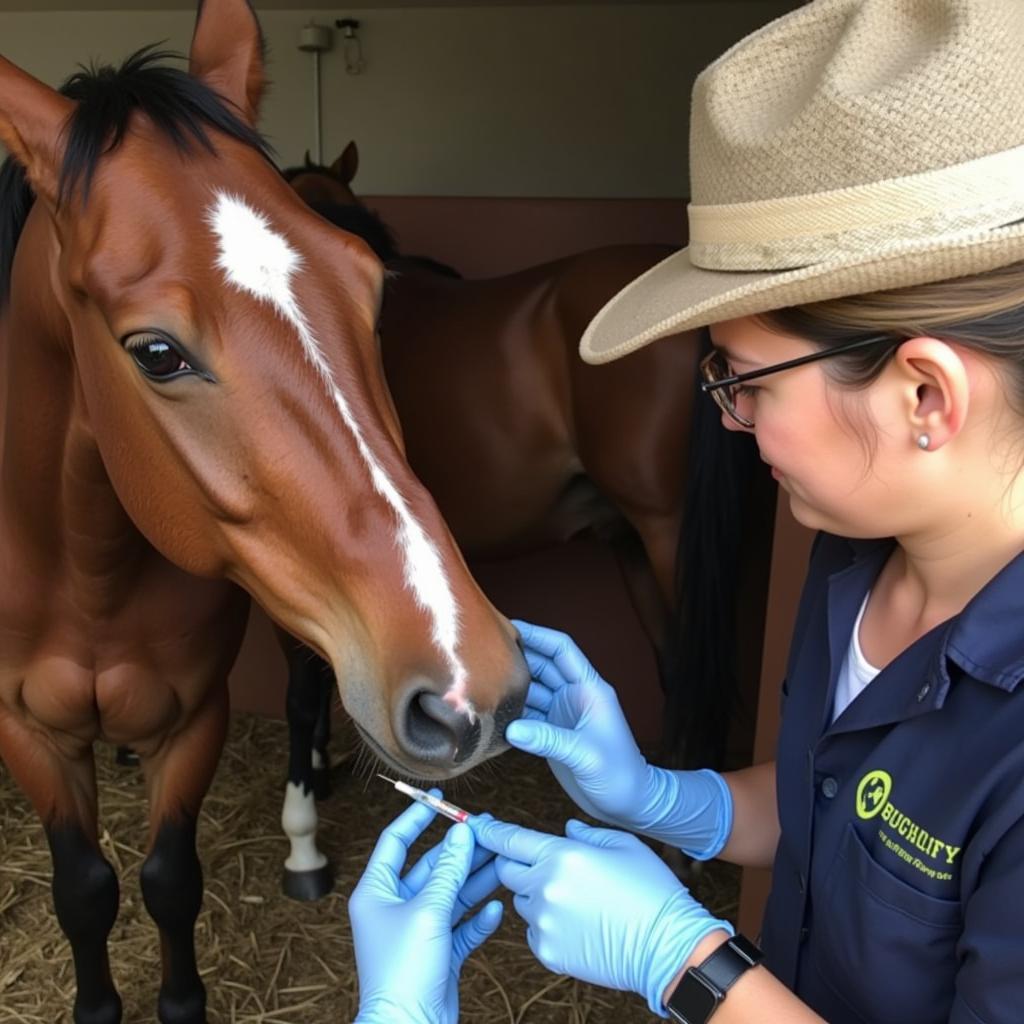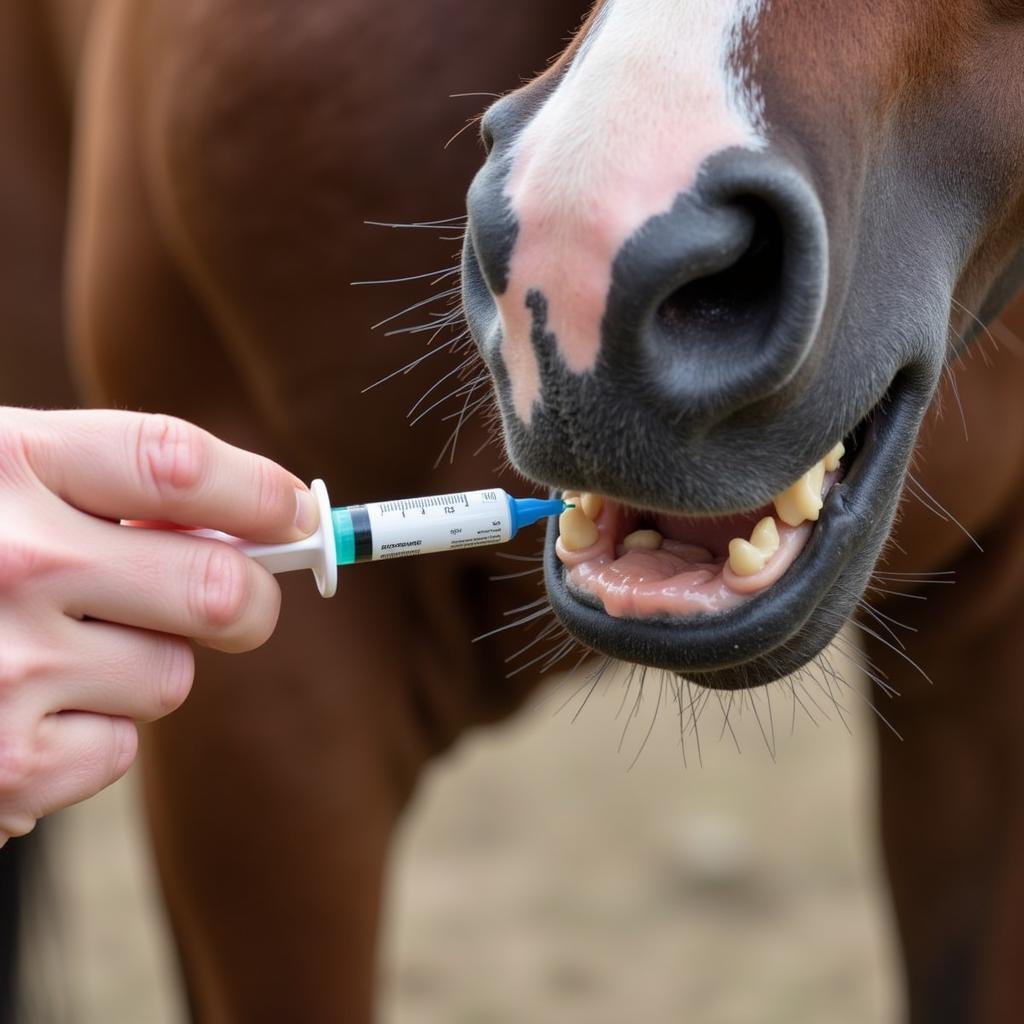Methocarbamol Dose For Horses is a crucial topic for horse owners. Understanding the correct dosage and administration of this muscle relaxant is essential for ensuring the well-being of your equine companion. This guide will delve into the intricacies of methocarbamol for horses, covering everything from dosage guidelines to potential side effects.
Understanding Methocarbamol for Horses
Methocarbamol is a centrally acting skeletal muscle relaxant commonly used in horses to treat muscle spasms, stiffness, and pain associated with various conditions. It works by depressing the central nervous system, reducing muscle activity and promoting relaxation. This medication is often prescribed for conditions such as tying-up syndrome, muscle injuries, and tetanus. It’s important to remember that methocarbamol is a prescription medication and should only be administered under the guidance of a veterinarian. They will determine the appropriate methocarbamol dose for horses based on individual factors like weight, condition, and overall health.
 Administering Methocarbamol to a Horse
Administering Methocarbamol to a Horse
Determining the Correct Methocarbamol Dose for Horses
The appropriate methocarbamol dose for horses varies depending on the severity of the condition being treated. A typical initial intravenous dose ranges from 15 to 20 mg/kg, which may be repeated every six hours as needed. For less severe cases, oral administration may be an option, with dosages typically ranging from 15 to 60 mg/kg per day, divided into two to three doses. It’s vital to adhere strictly to your veterinarian’s prescribed dosage and avoid exceeding the recommended amount. Overdosing can lead to adverse effects, so accurate measurement and administration are paramount. muscle relaxers for horses can be beneficial, but it’s essential to use them responsibly.
What is the usual methocarbamol dosage for a horse?
The usual initial intravenous methocarbamol dose for a horse is 15-20 mg/kg. Oral doses range from 15-60 mg/kg per day. Always consult your vet for the correct dosage.
Administering Methocarbamol to Horses
Methocarbamol can be administered intravenously (IV) or orally. IV administration is generally preferred for initial treatment of acute conditions, as it provides more rapid relief. Oral administration is typically used for long-term management or less severe cases. Regardless of the administration route, always follow your veterinarian’s instructions carefully.
 Oral Methocarbamol for Horses
Oral Methocarbamol for Horses
Potential Side Effects and Precautions
While generally safe, methocarbamol can cause some side effects in horses, including drowsiness, ataxia (lack of coordination), and decreased appetite. Less common side effects include salivation, vomiting, and excitement. If you notice any unusual behavior or symptoms after administering methocarbamol, contact your veterinarian immediately. It’s important to be aware of potential drug interactions. Methocarbamol may interact with other medications, so inform your veterinarian of all other drugs your horse is currently taking, including supplements. methocarbamol for horses dosage requires careful consideration to avoid potential complications.
What are the side effects of methocarbamol in horses?
Common side effects of methocarbamol in horses include drowsiness, ataxia, and decreased appetite. Less common effects include salivation, vomiting, and excitement.
Dr. Emily Carter, DVM, specializing in equine sports medicine, emphasizes the importance of monitoring: “After administering methocarbamol, carefully observe your horse for any adverse reactions. Early detection can prevent complications.”
Long-Term Management with Methocarbamol
In some cases, long-term management with methocarbamol may be necessary. For chronic muscle conditions, your veterinarian may prescribe a lower maintenance dose. Regular monitoring is crucial to assess the effectiveness of the treatment and adjust the dosage as needed. methocarbamol horses dosage must be adjusted based on the individual horse’s response to the medication.
Conclusion
Understanding the appropriate methocarbamol dose for horses is vital for responsible horse ownership. This comprehensive guide provides valuable insights into the usage, dosage, administration, and potential side effects of this muscle relaxant. Always consult your veterinarian for personalized advice and guidance on using methocarbamol for your horse. horse muscle relaxant like methocarbamol can significantly improve a horse’s comfort and well-being when used correctly.
FAQ:
- How often can I give my horse methocarbamol?
- Can methocarbamol be given orally to horses?
- What should I do if my horse overdoses on methocarbamol?
- Can methocarbamol be used in pregnant mares?
- How long does it take for methocarbamol to take effect in horses?
- Are there any alternative treatments to methocarbamol for muscle spasms in horses?
- How do I store methocarbamol?
For further information, explore other articles on our website related to equine health and medication.
Need assistance? Contact us 24/7: Phone: 0772127271, Email: [email protected], or visit us at QGM2+WX2, Vị Trung, Vị Thuỷ, Hậu Giang, Việt Nam.